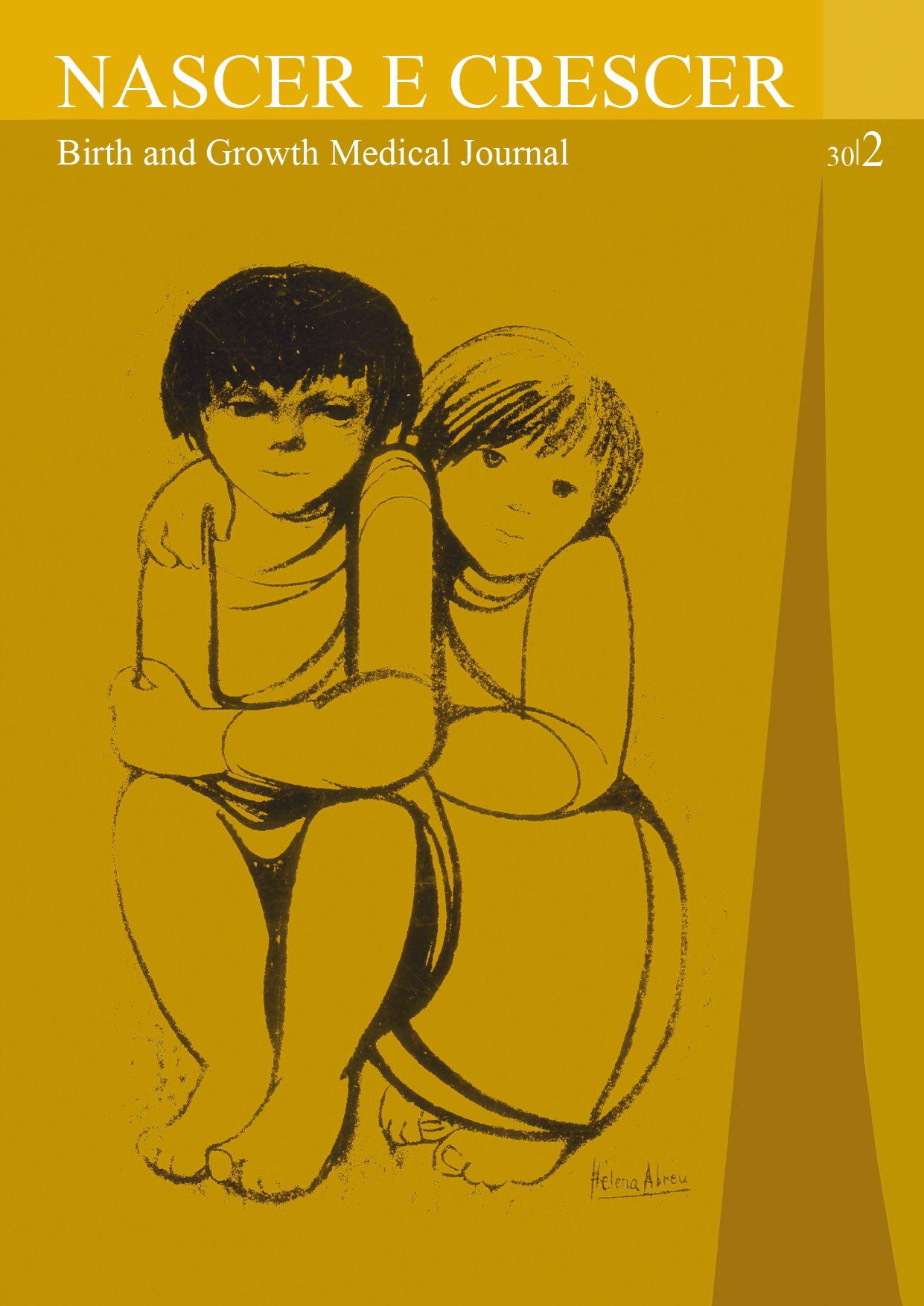Regressão da linguagem com manifestação de epilepsia
DOI:
https://doi.org/10.25753/BirthGrowthMJ.v30.i2.17501Palavras-chave:
cognição, epilepsia, síndromes epiléticos, síndrome de Landau-KleffnerResumo
Introdução: As encefalopatias epiléticas são um conjunto de síndromes dependentes da idade, em que a atividade paroxística ictal e interictal é responsável por deterioração cognitiva e neuropsicológica.
Caso Clínico: Um rapaz de quatro anos de idade, previamente saudável, foi admitido no Serviço de Urgência devido a um quadro de regressão da linguagem compreensiva e expressiva com quatro dias de evolução, associado ao surgimento de crises epiléticas. As características clínicas e alterações no eletroencefalograma conduziram ao diagnóstico de síndrome de Landau-Keffner. O rapaz foi tratado com valproato, clobazam e prednisolona, com melhoria da linguagem.
Discussão/Conclusão: A síndrome de Landau-Kleffner é uma encefalopatia epilética rara, caracterizada por afasia adquirida, epilepsia e anomalias paroxísticas eletroencefalográficas. Deve haver suspeita clínica perante uma criança com desenvolvimento normal que inicia um quadro de regressão da linguagem. O diagnóstico precoce e tratamento adequado são importantes para melhorar o prognóstico.
Downloads
Referências
Landau WM, Kleffner FR. Syndrome of acquired aphasia with convulsive disorder in children. Neurology. 1957; 7:523–30.
Berg AT, Berkovic SF, Brodie MJ, Buchhalter J, Cross JH, van Emde Boas W, et al. Revised terminology and concepts for organization of seizures and epilepsies: report of the ILAE Commission on Classification and Terminology, 2005–2009. Epilepsia. 2010; 51:676–85.
Landau WM, Kleffner FR. The Landau-Kleffner syndrome. Epilepsia. 2009; 50:3.
Wilfong A. Epilepsy syndromes in children [accessed 25 March 2020]. Available at: https://www.uptodate.com.
Caraballo RH, Veggiotti P, Kaltenmeier MC, Piazza E, Gamboni B, Lopez Avaria MF, et al. Encephalopathy with status epilepticus during sleep or continuous spikes and waves during slow sleep syndrome: a multicenter, long-term follow-up study of 117 patients. Epilepsy Res. 2013; 105:164-73.
Stefanatos G.Changing perspectives on Landau-Kleffner syndrome. Clin Neuropsychol. 2011; 25:963-88.
Motwani N, Afsar S, Dixit N, Sharma N. Landau-Kleffner syndrome: an uncommon dealt with case in Southeast Asia. BMJ Case Rep. 2015.
Pearl PL, Carrazana EJ, Holmes GL. The Landau-Kleffner syndrome. Epilepsy Curr. 2001; 1:39–45.
Ballaban-Gil K. Language disorders and epilepsy. Pedley TA, Meldrum BS eds. Recente advances in epilepsy. 2nd ed. London: Churchill Livingstone, 1998:205-19.
Maquet P, Hirsch E, Dive D, Salmon E, Marescaux C, Franck G. Cerebral glucose utilization during sleep in Landau-Kleffner syndrome: a PET study. Epilepsia. 1990; 31:778.
Takeoka M, Riviello JJ Jr, Duffy FH, Kim F, Kennedy DN, Makris N, et al. Bilateral volume reduction of the superior temporal areas in Landau-Kleffner syndrome. Neurology. 2004; 63:1289.
Bourgeois BF, Landau WM. Landau-Kleffner syndrome and temporal cortical volume reduction: cause or effect? Neurology. 2004; 63:1152.
Tasinari CA, Cantalupo G, Dallabernardina B, Darra F, Bureau M, Cirelli C, et al. Encephalopathy related to status epilepticus during slow sleep (ESES) including Landau-Kleffner syndrome. Epileptic Syndromes in Infancy, Childhood and Adolescence 5th ed John Libbey Eurotext Chapter: 16.
Conroy J, McGettigan PA, McCreary D, Shah N, Collins K, Parry-Fielder B, et al. Towards the identification of a genetic basis for Landau-Kleffner syndrome. Epilepsia. 2014; 55:858-65.
Szepetowski P. Genetics Studies in Idiopathic Focal Epilepsies in Childhood. J Pediatr Epilepsy 2016; 05:139-41.
Hughes Jr. A review of the relationships between Landau-Kleffner syndrome, electrical status epilepticus during sleep, and continuous spike-waves during sleep. Epilepsy Behav. 2011; 20:247-53.
Marescaux C, Hirsch E, Finck S, Maquet P, Schlumberger E, Sellal F, et al. Landau-Kleffner syndrome: a pharmacologic study of five cases. Epilepsia. 1990; 31: 768–77.
Arts WF, Aarsen FK, Scheltens-de Boer M et al. Landau-Kleffner syndrome and CSWS syndrome: treatment with intravenous immunoglobulins. Epilepsia 2009; 50:55-8.
Cross JH, Neville BG. The surgical treatment of Landau-Kleffner syndrome. Epilepsia. 2009; 50:63-7.
Van Bogaert P, Aeby A, De Borchgrave V, De Cocq C, Deprez M, De Tiège X, et al. The epileptic syndromes with continuous spikes and waves during slow sleep: definition and management guidelines. Acta Neurol Belg. 2006; 106:52-60.
Downloads
Publicado
Como Citar
Edição
Secção
Licença
Direitos de Autor (c) 2021 Joana Ferreira, Sofia Lopes, José Carmona Lopes, Cristina Ferreira, Catarina Magalhães

Este trabalho encontra-se publicado com a Creative Commons Atribuição-NãoComercial 4.0.
Copyright e Direitos dos Autores
Todos os artigos publicados na Revista Nascer e Crescer – Birth and Growth Medical Journal são de acesso aberto e cumprem os requisitos das agências de financiamento ou instituições académicas. Relativamente à utilização por terceiros a Nascer e Crescer – Birth and Growth Medical Journal rege-se pelos termos da licença Creative Commons "Atribuição - Uso Não-Comercial - (CC-BY-NC)"".
É da responsabilidade do autor obter permissão para reproduzir figuras, tabelas, etc. de outras publicações.
Juntamente com a submissão do artigo, os autores devem enviar a Declaração de conflito de interesses e formulário de autoria. Será enviado um e-mail ao autor correspondente, confirmando a receção do manuscrito.
Os autores ficam autorizados a disponibilizar os seus artigos em repositórios das suas instituições de origem, desde que mencionem sempre onde foram publicados e de acordo com a licença Creative Commons.


